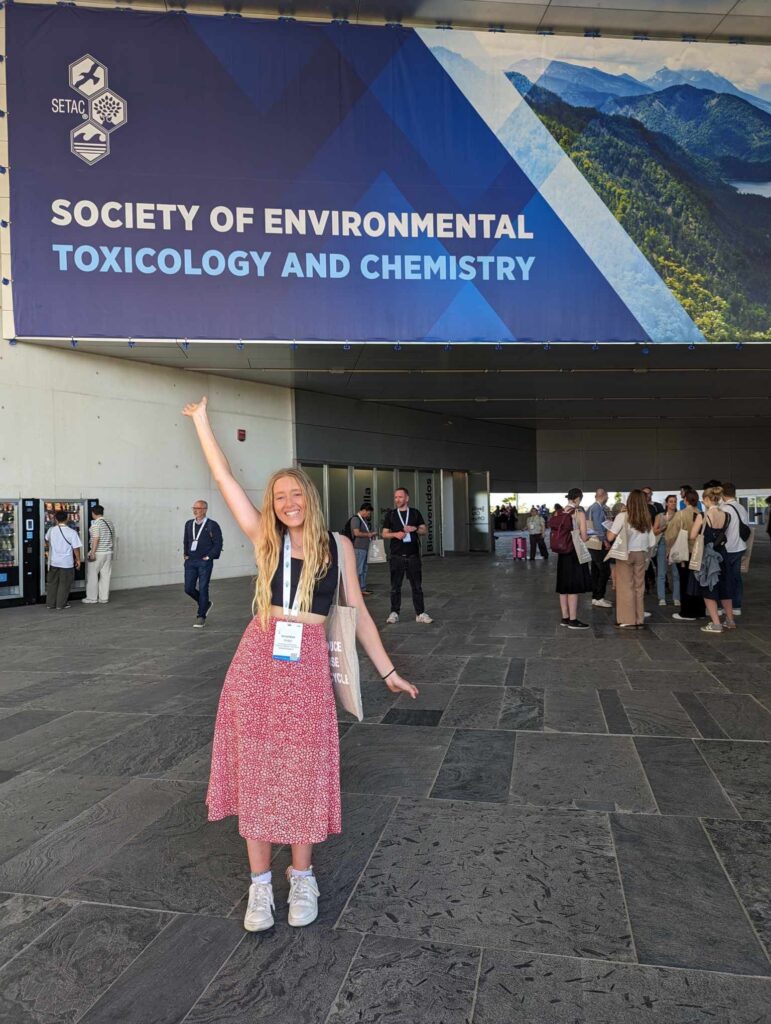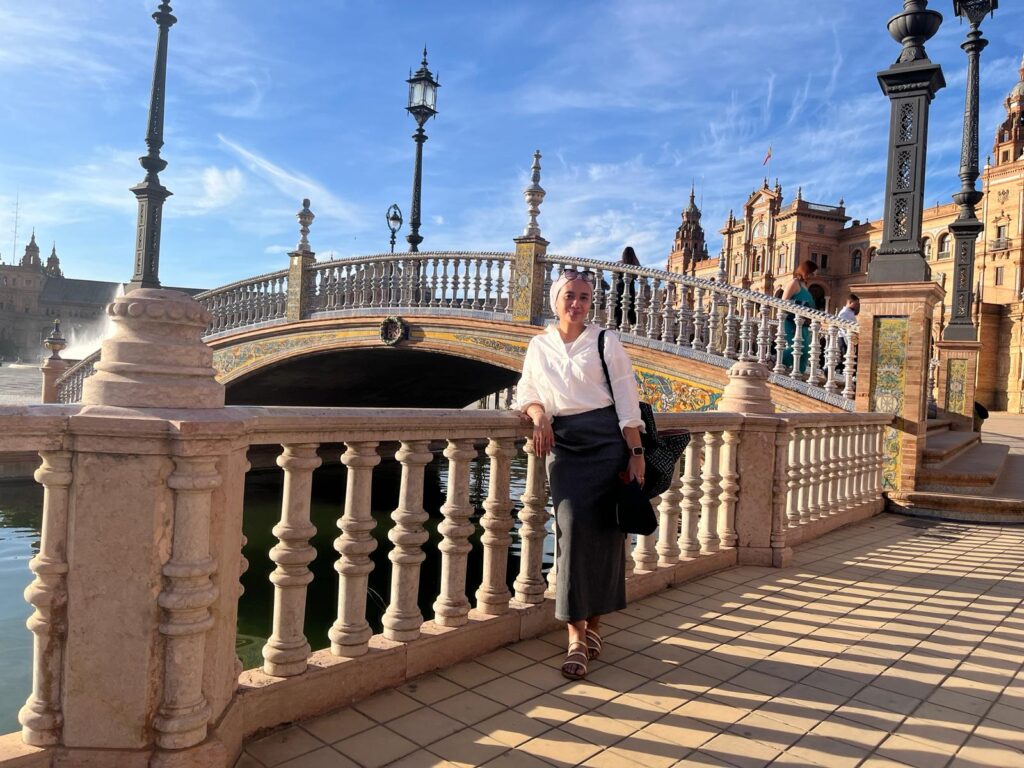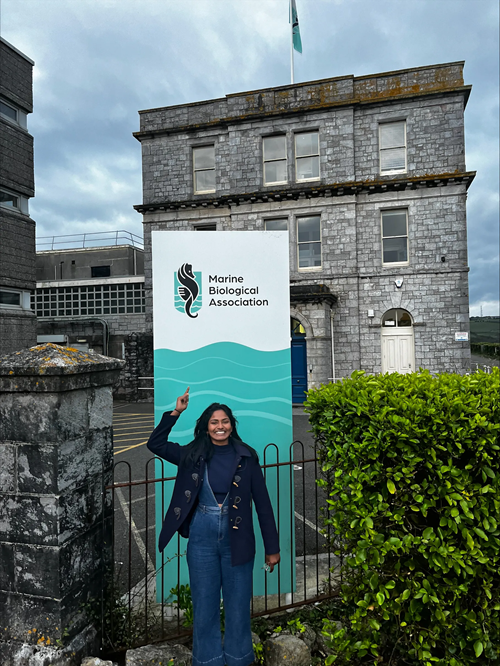For the past two decades, the MBA has provided bursaries to hundreds of MBA Student Members, giving them the opportunity to attend international and prestigious events and conferences in the field of marine biology.
After a rigorous selection process, we are proud to announce the following recipients of the bursary:

Anneliese Hodge
Anneliese Hodge, a PhD Student at the University of Plymouth and Plymouth Marine Laboratory attended the Society of Environmental Toxicology and Chemistry (SETAC) conference held in Seville, Spain. The meeting had over 3,000 attendees from all over the world working in academia, industry and government.
The conference brought together professionals working on both aquatic and terrestrial environments, including ecotoxicologists, ecologists, modelers, social scientists, chemists, regulatory officials and many others.
She said: “I attended various talks and plenary sessions, all of which were extremely insightful. It was great to see so many people who share a passion for environmental toxicology and the common goal of improving the health of the environment and ourselves.
There were nearly 2,000 posters on display, highlighting the current research being undertaken in different environmental toxicology disciplines. Whilst a number of talks and posters emphasized on a rather bleak picture when it comes to environmental health and anthropogenic impacts, it was also great to see a number of presentations that provided a sprinkle of hope too.
During the conference, I was lucky enough to have the opportunity to present my work on the ecotoxicological effects of sunscreens and UV filters on the marine environment from both my Masters of Research and PhD to date.
This allowed me to practice my science communication and presentation skills and become more confident in articulating myself when answering questions. I would like to thank the Marine Biological Association for supporting my trip to Seville to attend SETAC through the MBA member grant.
There is a great deal of fantastic research being conducted in the field of environmental toxicology and I am grateful to have been given the opportunity to engage and be a part of the SETAC community!”

Nur Azeyanti Norhashim
Nur Azeyanti Norhashim, a second-year PhD student in Environmental Biology who is interested in the effects of marine plastic pollution on benthic marine invertebrates, was also able to attend the SETAC EUROPA 34th Annual Meeting in Seville.
She said: “My heart pounded with excitement as I presented a poster showcasing my PhD work, a study on the effects of marine pollution, specifically microplastics, on the metabolism of wild blue mussels from the Isle of Cumbrae, Scotland.
Standing by my poster, I eagerly awaited interested participants, which at first I doubt people would come. To my delight, a diverse group from a diverse group of individuals from across the globe including South Korea, the US, Spain and others came to stop by at my poster stand. Some were taking photos, their interest by the poster and some listened intently as I explained my research on the prevalence of microplastics and their effects on mussels and oysters across different geographical area such as Scotland, Hong Kong and Malaysia.
The conference was a melting pot of brilliant minds, many sharing a common interest in the blue mussel as a model organism, like mine. I had engaging discussions with a PhD student from the Philippines studying the cellular response of blue mussels to aged microplastics, and a Spanish postdoc who shared her technical expertise on polymer identification.
The conference also served as a platform for job hunting and exploring postdoctoral opportunities. I was impressed by the organization of the event and the job opportunities it provided to participants. The exhibitors, from a wide range of multidisciplinary backgrounds, were welcoming and informative.
As I shared my other experiences in field work, ranging from marine mammal population and behavioural studies, fish stock assessment to turtle conservation across the South China Sea, I realized how these experiences dovetailed with the diverse job roles presented by the exhibitors. This networking opportunity was invaluable, and I believe it will yield significant benefits in the future.
I am deeply grateful to the MBA for providing the bursary that made this experience possible. I left Seville with a renewed sense of purpose and a firm belief that small steps indeed lead to big outcomes. This conference was not just an event, but a milestone in my academic journey, one that I will cherish forever. I would also like to express my heartfelt gratitude to the Membership team, whose invaluable assistance throughout the bursary process was instrumental in making this journey possible.”

Shathuki Perera
Shathuki Perera who is studying a Masters in Marine Biology at Oxford University was awarded an MBA Student Bursary., which she used to attend the 20th MBA Postgraduate Conference held in Plymouth.
The MBA Postgraduate Conference is an annual event run by and for postgraduate students and early career researchers in the field of marine biology. From kelp, seagrass to plankton and marine microbiome, the talks cover a diverse range of topics and offers significant networking opportunity with researchers from esteemed marine organisations.
The 20th Postgraduate Conference was hosted by the Marine Biological Association (MBA), Plymouth Marine Laboratory (PML) and the University of Plymouth, with the final conference dinner held at the National Marine Aquarium.
Thanks to the bursary, Shathuki was able to present her Master’s research at the conference and take part in an applied marine science panel.
Shathuki’s research on the consumption of elasmobranchs in Sri Lanka was received very well and led to interesting thoughts and additions from those attending, which she hopes to incorporate into her thesis.
Shathuki also introduced herself recently on the MBA Membership Community pages, and managed to squeeze in a quick lunch time visit to the National Marine Biological Library (NMBL), based at the MBA.
As Shathuki approaches the end of her Master’s program, she finds herself at a crucial point in her career.
She said: “I needed to decide whether to pursue a PhD or embark on a career outside of academia.
Attending this conference, and talking to those who has surpassed this stage, provided me with much needed mentorship and advice which will be pivotal in making my decision. The connections I made with other students in this field hold promise for future collaboration and opportunities. Additionally, a dinner at the National Aquarium next to the shark tank was a definite highlight!”
How to apply for an MBA Student Bursary
The MBA Student Bursary Program aims to provide financial support to individuals pursuing higher education or research opportunities in marine biology. With a strong belief in the importance of empowering the next generation of marine scientists[AS1] and educators, the MBA seeks to support aspiring marine biologists to achieve their academic and professional goals.
For more information about MBA bursaries, please visit our Student Bursary Application webpage or contact the Membership team at membership@mba.ac.uk.
Find out more and become an MBA Member today.